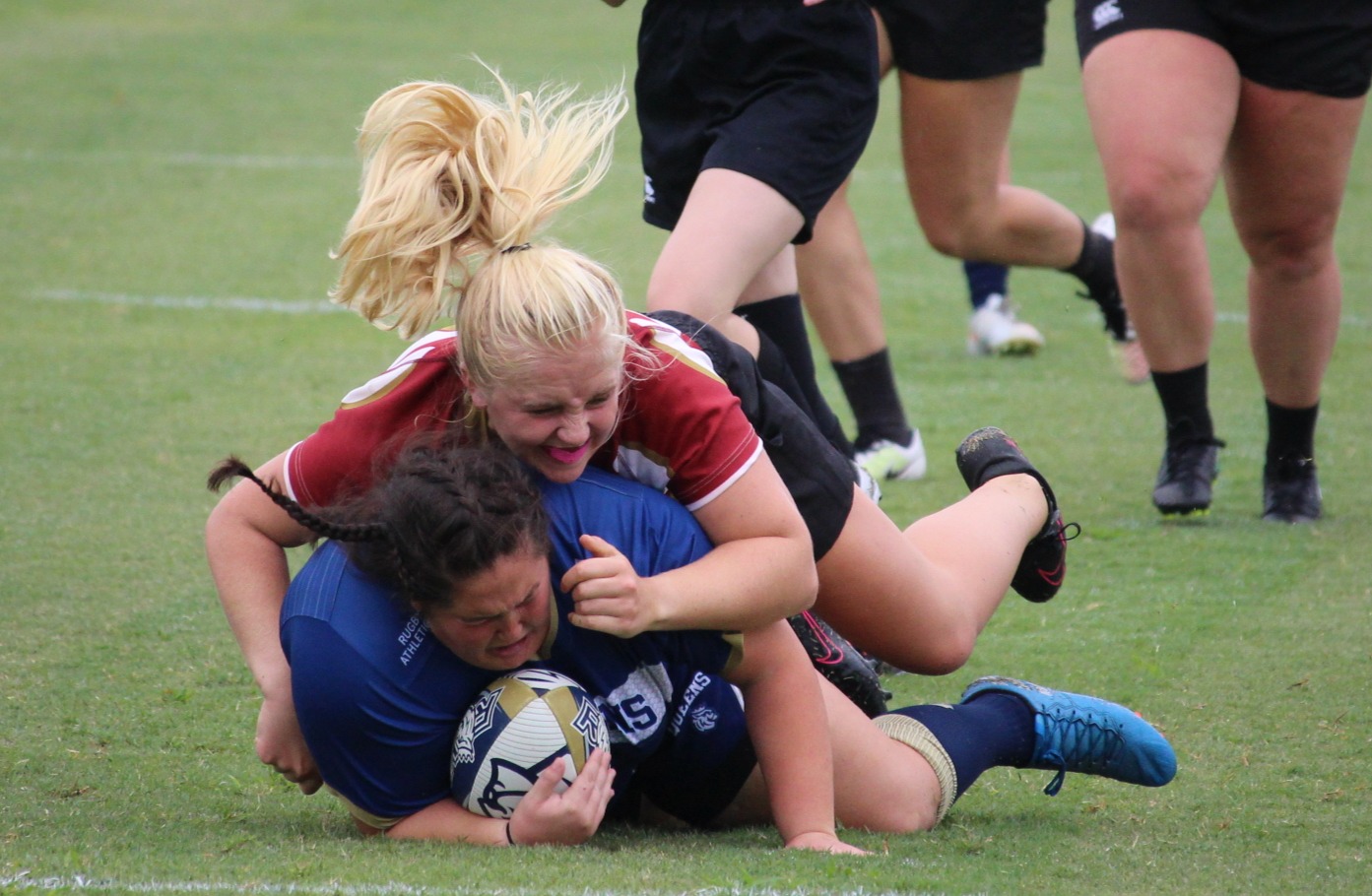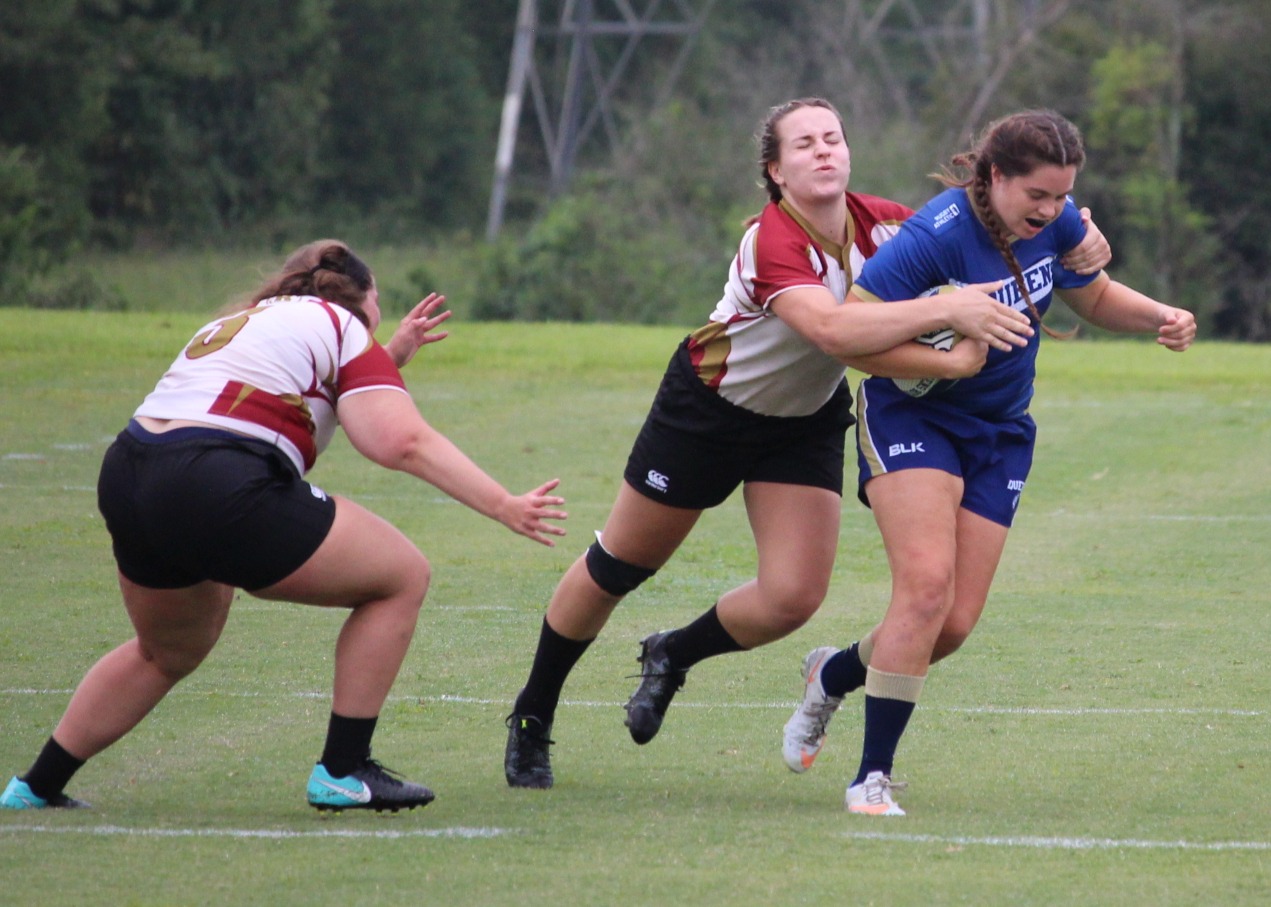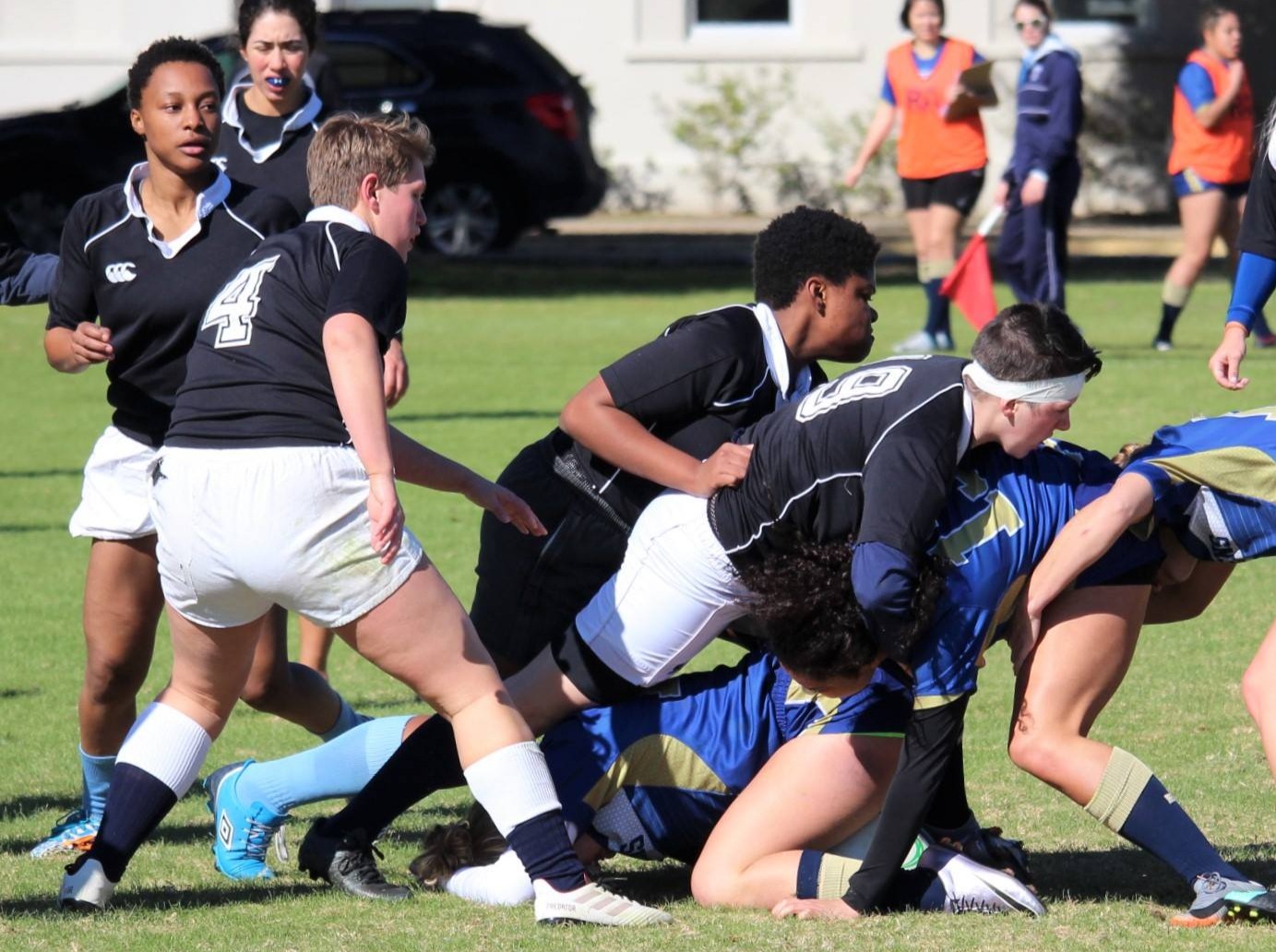
Elon (maroon) is one SARC member / Photo: Amy Nicholson
When USA Rugby announced plans to reorganize, Elon University (N.C.) head coach Alley Mitchell considered the implications on the region. If the national governing body ceased to exist, then there would be a host of colleges looking for guidance and a new home, and Mitchell wanted to be prepared for that possibility. So began the creation of the South Atlantic Rugby Conference (SARC), a hybrid competition under National Collegiate Rugby (NCR).
Mitchell started playing rugby as a middle schooler in Canada and continued through high school, college and the U.S. military. Her playing career, which spans more than 20 years, involves time with a men’s team when there was no women’s rugby to be played, and helping create the Arctic Foxes to fill that void in Alaska. She’s been coaching for approximately a decade, and in October 2018, Mitchell accepted the head coaching position at Elon.
“The team itself was hurting,” Mitchell said. “They felt like they’d been abandoned by the previous coaches. … My main goal was building a good inclusive team culture and family for those girls. I didn’t want to go in and undo everything they had already done but wanted to make sure the transition was easier on them.”
Elon was competing in the NSCRO (now “NCR Small College Division”) Carolinas conference and during Mitchell’s first week on the job, the team played Queens University of Charlotte. Queens joined NIRA, the NCAA varsity league, last year, but in fall 2018, it was able to field sides in both the USA Rugby DII Carolinas conference and the NSCRO-aligned Carolinas conferences.

Elon vs. Queens / Photo: Amy Nicholson
“It was a really good game and they held Queens to a kick and a try,” Mitchell said. “That was the first part of the transition: A lot of trust was built because a lot of what we had practiced that week came out in the game. It was a good core group of girls, and they’re still here today.”
Mitchell and the players invested in each other, but the conference itself was down to four teams (Elon, The Citadel, Lander University, Guilford College) by fall 2019. The coach noted the effect of a thin schedule on player engagement and retention, and to boot, both Lander and Guilford declared intentions to join NIRA. But then in December, USA Rugby announced plans to reorganize, and the uncertainty of the national governing body’s future put Mitchell into action.
“When we found out things with USA Rugby weren’t going to be great this year, we started planning,” Mitchell said. “‘If this happens, we’ll end up with at least 10 schools [from USA Rugby] coming to us, so we need to be prepared.’ I started laying the groundwork and talked to Amy George, The Citadel coach. ‘What would this look like?’”
George is a former conference commissioner for the DII Carolinas and knows that landscape well. Ultimately, those DII teams that competed in USA Rugby structures aligned with the College Rugby Association of America (CRAA) and kept their spring 15s seasons intact. But there were outliers, as well as other entities in the South considering new competitive options.

The Citadel joined SARC / Photo: Amy Nicholson
Marty Sarkees, head coach at Clemson University, was one of them. The South Carolina team had been competing in the DI Blue Ridge conference, which plays a split 15s season that culminates with the USA Rugby spring championship.
“Blue Ridge is not a good place for us and it has nothing to do with the conference itself,” Sarkees noted the competitive level of the league. “There’s a big divide right now in rugby on spring and fall 15s. There are a lot of clubs that just want to do fall 15s and focus on spring 7s, and we fall into that category.
“This fall we went 2-1 in Blue Ridge – a good season,” Sarkees reviewed the first half of the 2019-20 league season. “Then we come back in the spring and my starting flyhalf, scrumhalf and lock are all on semester abroad. If another 2-3 girls don’t come back, all of a sudden my returning 15 is only 9-10, and two of those are key positions. It’s hard and it doesn’t work. We were able to recruit and train those girls up, but if the recruits aren’t as dynamic as they are this year, you could have a completely different season [compared to the fall]. That’s what happens to me every semester. It doesn’t fit.”
Lander University head coach Buck Billings was also looking to bulk up the local competition. He indicated that the Bearcats intend to join NIRA in fall 2021 and thus align with the NCAA varsity league’s championship season in the fall. Lee University, too, would benefit from a structured competition, as the Chris Martin-coached program has played an independent schedule en route to regular NCR playoff appearances.

UNC Greensboro moved from DII Carolinas / Photo: Amy Nicholson
And then there is southwest Virginia. Several small schools and new programs have sprouted in the state, and there’s a collective effort to support each other’s teams and provide meaningful competition. The teams contest local round robin 7s tournaments in the fall, and will combine teams to play other 15s squads. Teams like Roanoke College, Radford University, Emory & Henry, Virginia Military Institute and the University of Richmond had started conversations about forming a league, and they were introduced to Mitchell. [Stay tuned for more on Virginia]
Mitchell and collaborators created SARC, a completely new league, and joined the NCR for fall 2020. The competition involves, at the time of print, 12 teams from five states, and is divided into North, East and West regions. It’s a hybrid league, meaning regular-season play will see crossover between its Open and Small College divisions, and then teams will separate out for the post-season. When there are longer distances to travel, a host site located midway between opponents will be chosen, and the opportunity to play additional or B side matches will be possible.
“It wasn’t hard to sell NSCRO, or NCR,” Mitchell recounted conversations with previously aligned USA Rugby teams. “The reason we’re there is because they care for women’s rugby. The culture they’ve already made is what I talk about with new schools. ‘This is what they do for women’s rugby and women’s colleges.’”
Mitchell noted well communicated playoff pathways, distinct seasons, monthly and championship awards for players, select-side opportunities. She relays her personal experience with the all-star 7s championship and the positive change she saw in her own squad when the Carolinas sent a team to St. Petersburg, Fla., in January.
“[NCR] is a little different and it’s good for the wax and wane of club sports,” Mitchell said of flexibility. “Some of the smaller schools joining us didn’t know they could join us because they were playing 7s. But it doesn’t matter with NCR. They just want you to go and play rugby so the sport grows. And if you’re trying to start a team, they’ll offer to help you.”
“I am so excited about the addition of SARC to the Open Competition,” NCR Open Division commissioner Angela Smarto enthused. “Watching Alley and everyone else become their own advocates and leaders of change is energizing. I want to work for them to ensure these new teams have a great experience in NCR.”
The founding members of SARC include:
Univ Alabama Birmingham (AL)
The Citadel (SC)
Clemson Univ (SC)
Elon Univ (NC)
Emory & Henry College (VA)
Lander Univ (SC)
Lee University (TN)
UNC Greensboro (NC)
Roanoke College (VA)
Univ South Carolina (SC)
Univ Tennessee – Chattanooga (TN)
Univ Tennessee – Knoxville (TN)
The teams range from existing NCR members, to former USA Rugby DI and DII teams, to first-time conference members. Mitchell expects more commits as approvals are finalized.
“I would love teams from the coastal South Carolina area to come in,” Mitchell said of growth opportunities. “The College of Charleston and Citadel are 10-15 minutes from each other. We’re looking at Georgia teams, too.”
The Carolinas, Florida and South Independent conferences also operate in the southern region, and they have committed to the CRAA. Individual teams, however, are making their own decisions, as seen with Salisbury University leaving spring-based Capital for fall-based MARC, and the University of Iowa leaving the Midwest for CRAA.
“Giving them a home and someone to look out for them were important to me,” Mitchell said of motivation. “We want to get everyone in a place where they’re playing games. Everyone’s not going to be happy but we’re trying to make it the best year we can given our circumstances. It will be difficult to manage because some schools will be back to play sooner than others, while some will be online only next year.”
Click here for more information on the shifting college scene. To learn more about SARC, e-mail SARC.Women@gmail.com or visit the SARC homepage.


